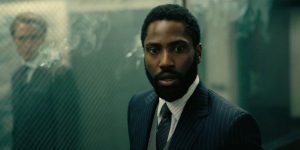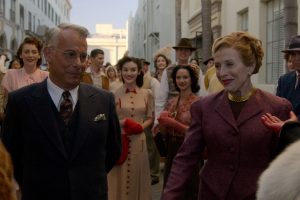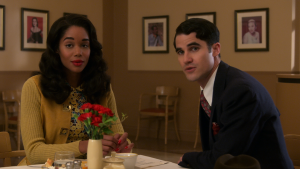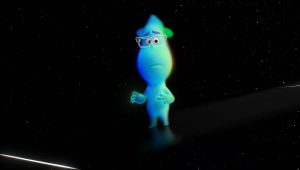Something new from me today, a compilation of bite-sized reviews for films and TV shows I watched in the past week that I probably wouldn’t be able to review otherwise. I can’t assure that I’ll have one of these posts going up every week, but I wanted to test out the format after considering for a long time how I could review a wider variety of titles without feeling the pressure to write a specific amount of words about each one, or get bogged down simply trying to find images. So without further ado, here’s my “Lightning Round-up” for the week of August 7th to 13th, 2023.
* – A title I’ve previously watched

The Uncanny Counter (Netflix). The premise: an unconventional family of grim reapers in the business of rescuing souls from evil spirits and leading them to the afterlife lose a member in battle and recruit a teen boy to help take on their greatest threat – a powerful demon being maneuvered by political forces. The sixteen-episode first season is a perfect blend of heartwrenching drama, endearing humor, compelling intrigue, and low-budget special effects, anchored by emotional performances from all the main cast, Yeom Hye-ran in particular. The second season (airing weekly on Korean television and on Netflix, with five episodes released thus far) is tonally inconsistent with the first, and devotes entirely too much screentime to new characters that range from uninteresting to downright grating, but Kang Ki-young and Kim Hieora are genuinely brilliant additions as the season’s primary antagonists, bringing an effortless ferocity to their action sequences, which are longer and more intricately choreographed this season thanks to a higher budget (at the cost of a few episodes). This is probably some of the most fun I’ve had watching a television series this year.

Zombieverse (Netflix). The premise: contestants must work together to survive a zombie apocalypse on the streets of Seoul, South Korea. I’ve only watched the first two episodes so far, but I could tell you from the trailer alone that this is the kind of show designed and destined to become a viral sensation (EDIT: I wrote this paragraph earlier in the week; checking back in, it seems that Zombieverse has indeed acquired a large and loyal fanbase, though many viewers are casting doubts on its claims of being “unscripted”, so I was partially right). My anxiety spiked when, at the end of the first episode, a stunt double playing a zombie was seemingly run over by a car and “killed”, along with a passenger in the vehicle. I’m assuming there’s safety measures in place to prevent anyone being seriously injured in the gory chaos? I’m rooting for contestant Lee Si-young, who kept her wits about her in a crisis while most of the others panicked and fled.

The Wheel Of Time Season 1, Episode 6* (Amazon Prime Video). The premise: Moiraine Damodred fights against time to free herself and her five young traveling companions from the intricate political machinations of the Aes Sedai before her plan to pit the Dragon Reborn against the Dark One is exposed in an episode written and filmed almost exclusively from her perspective. I stand by much of what I wrote regarding this episode in my initial review, though I would add that in retrospect, while it’s still one of my favorite episodes in the first season (purely due to Rosamund Pike and Sophie Okonedo’s phenomenal performances, which should have landed them both Emmy nominations), the writing is inconsistent – and noticeably weakest when it comes to fleshing out antagonist Liandrin Guirale, though if she lacks nuance, at least she’s never boring with Kate Fleetwood in the role, rocking her distinctive crimson get-up. And on that note, costume designer Isis Mussenden finally struck gold with her designs for this episode; Moiraine’s blue satin gown and diadem is iconic as far as I’m concerned.
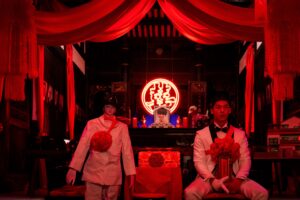
Marry My Dead Body (Netflix). The premise: in Taiwan, the first country in Asia to legalize same-sex marriage, a fervently homophobic police officer accidentally marries the ghost of a young gay man killed in a hit-and-run, and together they investigate the mysterious circumstances surrounding his untimely death in this zany, oftentimes heartwarming, LGBTQ+ buddy comedy. “Gayer than I expected, straighter than I would have liked” is probably how I would sum up Marry My Dead Body, which plays a cruel bait-and-switch on its viewers regarding the main character’s sexuality in just the first few minutes. And while it teases the idea of its male leads developing a romantic connection (almost having them kiss at a gay nightclub in a scene played not for laughs, but with surprising earnestness and intensity), this subplot trails off towards the end, leaving the exact nature of their relationship up to interpretation. I mean, I ship it regardless, but it’s a bit of a shame the film doesn’t fully commit to the bit, because Greg Hsu has excellent chemistry with costar Austin Lin that ought to have been utilized to the fullest. Still, Marry My Dead Body is a lot of fun and I enjoyed it immensely, particularly for how unabashedly raunchy it is in comparison to a lot of queer comedies that deliberately “sanitize” their characters and depiction of queerness for the sake of straight audience-members.

Risqué Business: Japan (Netflix). The premise: across six episodes, comedian Shin Dong-yup and singer Sung Si-kyung aim to initiate more open and casual conversations amongst their predominantly Korean audiences about sex and sexual expression by exploring the vivid adult entertainment industry in neighboring Japan. I have so far found the series fairly enjoyable and occasionally illuminating, if somewhat limited in its scope and noticeably lacking perspectives from queer people in Japan (approximately 1 in 10 people in Japan identify as LGBTQ+, according to a 2019 survey). The second season, set in progressive Taiwan, premiering later this month, will hopefully help to make up for this deficiency and boost Korea’s own LGBTQ+ rights movement, which has made only slow progress in recent years. But the series has also received warranted backlash for talking extensively about the AV (adult video) industry without ever touching on the abuse and exploitation of AV stars, so there’s definitely still a lot of refinement to be done with this concept.
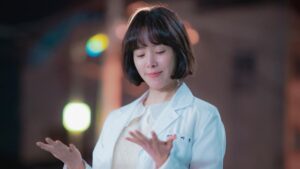
Behind Your Touch (Netflix). The premise: a veterinarian in a small town is struck by a meteor that gives her the psychic ability to read the memories of animals when she touches them, unintentionally putting her into conflict with a recently demoted detective bored by life in the countryside. With only two episodes on Netflix so far, the new series starring Han Ji-min has already popped into the platform’s Top Ten, and for good reason; it’s fun, fresh, abundantly quirky, and clever, with charming characters. I’m excited to keep up with this one.
Pretty sure that’s everything. Have you watched any of the titles on this list, or do you plan to? Tell me what sounds most intriguing in the comments below!
